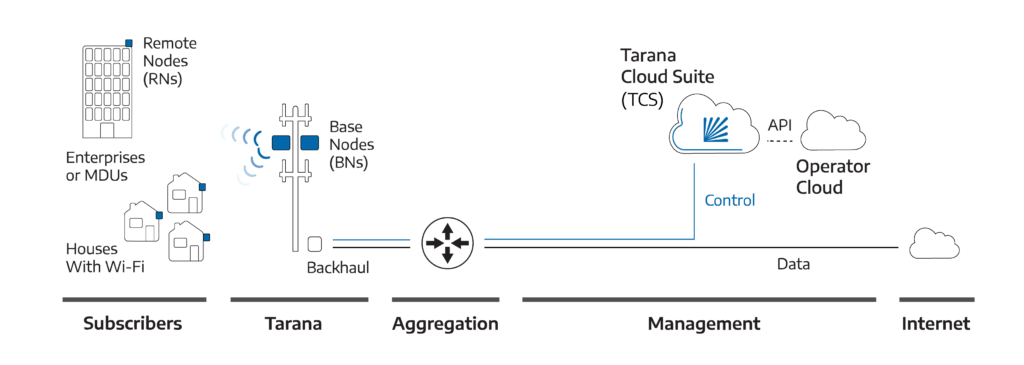BEAD Program & State Allocations for Funding
In This Post:

B.E.A.D.
The Broadband Equity, Access, and Deployment (BEAD) program provides $42.45 billion in federal funding to expand high-speed internet access in all 50 states, Washington, D.C., and U.S. territories. The BEAD program sponsors partnerships between states, territories, communities, and stakeholders to build high-speed internet infrastructure in unserved and underserved regions with funds originating from the 2021 Bipartisan Infrastructure Law.
Projects eligible for BEAD funding include:
- Installing internet and Wi-Fi in multi-unit residential buildings
- Conducting research, collecting data, outreach, and training for high-speed Internet deployment
- Providing internet access to unserved or underserved areas or improving service to community anchor organizations
- Funding digital equity programs
- Funding workforce development programs and vocational training
In June 2023, the Department of Commerce’s National Telecommunications and Information Administration (NTIA) allocated $42.45 billion to states, territories, and D.C. as part of its BroadbandUSA initiative. The list below presents a complete list of BEAD program state allocations.
BEAD Program State Allocations |
|
| State | Allocation Amount |
| Alabama | $1,401,221,901.77 |
| Alaska | $1,017,139,672.42 |
| Arizona | $993,112,231.37 |
| Arkansas | $1,024,303,993.86 |
| California | $1,864,136,508.93 |
| Colorado | $826,522,650.41 |
| Connecticut | $144,180,792.71 |
| Delaware | $107,748,384.66 |
| District of Columbia | $100,694,786.93 |
| Florida | $1,169,947,392.70 |
| Georgia | $1,307,214,371.30 |
| Hawaii | $149,484,493.57 |
| Idaho | $583,256,249.88 |
| Illinois | $1,040,420,751.50 |
| Indiana | $868,109,929.79 |
| Iowa | $415,331,313.00 |
| Kansas | $451,725,998.15 |
| Kentucky | $1,086,172,536.86 |
| Louisiana | $1,355,554,552.94 |
| Maine | $271,977,723.07 |
| Maryland | $267,738,400.71 |
| Massachusetts | $147,422,464.39 |
| Michigan | $1,559,362,479.29 |
| Minnesota | $651,839,368.20 |
| Mississippi | $1,203,561,563.05 |
| Missouri | $1,736,302,708.39 |
| Montana | $628,973,798.59 |
| Nebraska | $405,281,070.41 |
| Nevada | $416,666,229.74 |
| New Hampshire | $196,560,278.97 |
| New Jersey | $263,689,548.65 |
| New Mexico | $675,372,311.86 |
| New York | $664,618,251.49 |
| North Carolina | $1,532,999,481.15 |
| North Dakota | $130,162,815.12 |
| Ohio | $793,688,107.63 |
| Oklahoma | $797,435,691.25 |
| Oregon | $688,914,932.17 |
| Pennsylvania | $1,161,778,272.41 |
| Rhode Island | $108,718,820.75 |
| South Carolina | $551,535,983.05 |
| South Dakota | $207,227,523.92 |
| Tennessee | $813,319,680.22 |
| Texas | $3,312,616,455.45 |
| Utah | $317,399,741.54 |
| Vermont | $228,913,019.08 |
| Virginia | $1,481,489,572.87 |
| Washington | $1,227,742,066.30 |
| West Virginia | $1,210,800,969.85 |
| Wisconsin | $1,055,823,573.71 |
| Wyoming | $347,877,921.27 |
| American Samoa | $37,564,827.53 |
| Guam | $156,831,733.59 |
| Northern Mariana Islands | $80,796,709.02 |
| Puerto Rico | $334,614,151.70 |
| U.S. Virgin Islands | $27,103,240.86 |
BEAD Program State Allocations: Top 10
As the table above details, the following list represents the NTIA’s top ten largest allocations:
- Texas: $3.31 billion
- California: $1.86 billion
- Missouri: $1.47 billion
- Michigan: $1.56 billion
- North Carolina: $1.53 billion
- Virginia: $1.48 billion
- Alabama: $1.40 billion
- Louisiana: $1.36 billion
- Georgia: $1.31 billion
- Washington: $1.23 billion
The states, D.C., and US territories (all eligible entities) submitted initial BEAD funding proposals to the NTIA for approval by the end of 2023. State proposals are currently under review by the NTIA, as are any challenges from local governments, nonprofit organizations, and broadband service providers.
BEAD and the Risk of Overbuild

In a recent blog post, Tarana Wireless warned about the risk of overbuilding networks funded by the BEAD program because of the “reliable” technologies requirements—minimum speed (100/20 Mbps) and latency (≤100 ms)—for funding projects. Tarana explained that because the NTIA does not consider fixed wireless networks using unlicensed spectrum to be “reliable,” they could be subject to overbuild, even if the networks meet the minimum speed and latency requirements.
To protect their networks, fixed wireless operators can participate in the BEAD Planned Service Challenge process. Operators with locations vulnerable to overbuild can file a commitment to meet minimum “reliable” technology requirements at those locations by a specific date, which is June 30, 2024, for most states and territories.
Tarana’s G1 platform exceeds the “reliable” technology definition and enables fixed wireless operators to supply hundreds of megabits per second of services under the latency threshold. The G1’s ability to provide service over non-line-of-sight links in the face of RF interference makes it a key technology for robust, scalable networks.
WAV Can Help With BEAD and Other Network Needs
In partnership with Tarana, WAV can help you find the right tools to incorporate the G1 platform into your network as part of a BEAD project initiative. WAV can also help you find the right Tarana technology for any other network needs.
WAV has the biggest and most consistent stocking position in the networking market, and your dedicated sales representative takes a proactive, responsive, and communicative approach to your business. This enables you to access many supply chain, finance, engineering, and logistical resources.
Contact the networking experts at WAV for more help selecting the right enterprise networking vendors for your organization’s design and deployment challenges.
Learn more about Next Generation Fixed Wireless Access (ngFWA)






